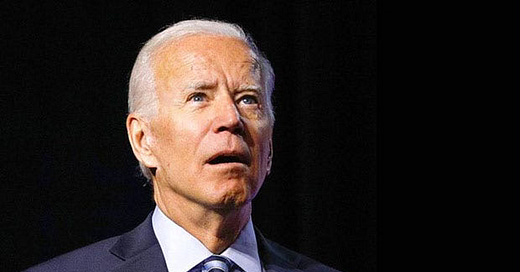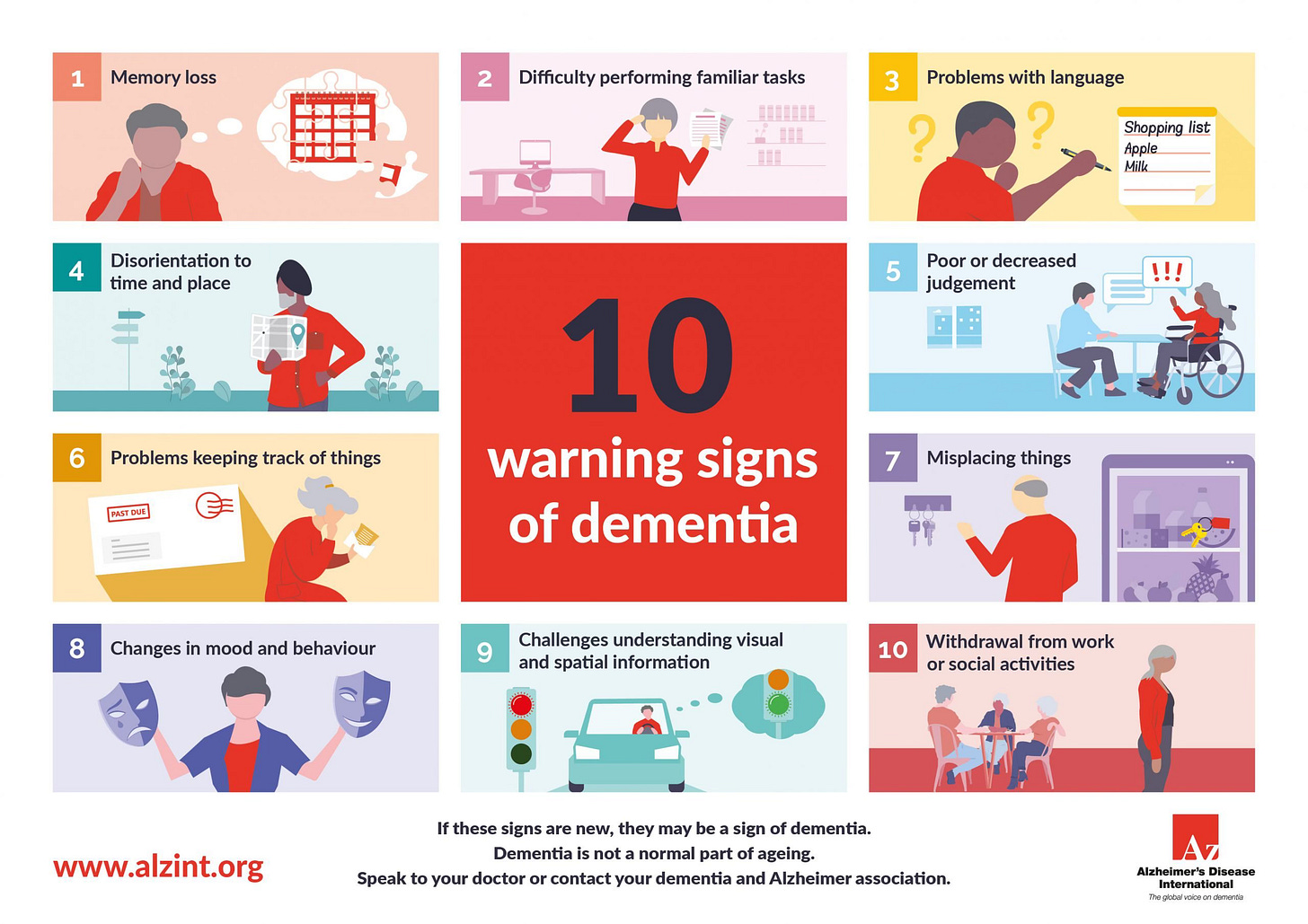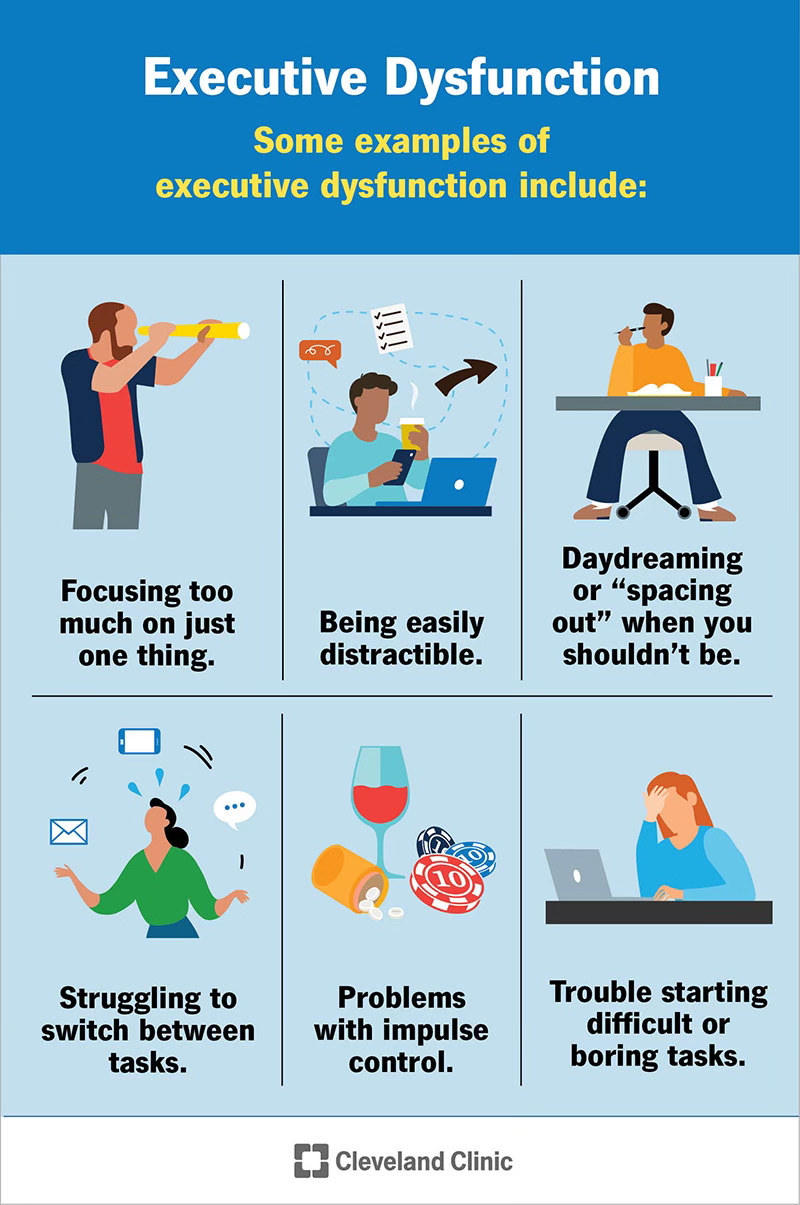GeroDoc’s Guide to the June 27th Presidential Debate - What to Expect
A lot has been made of Joe Biden’s lack of capacity and possible dementia going into tomorrow’s debate. What should viewers be looking for, if anything?
To get things out of the way.
To begin with, I want it to be known that chances are pretty good I will not be watching the debate. For one thing, the United States has gotten so, so far away from what political debates used to be (think Lincoln-Douglas style, where debate participants would have effectively nearly unlimited time to talk, uninterrupted, in front of an live audience and rebut each other) to what we will see on Thursday night, June 27th, 2024 - is a highly artificial exchange with no audience.
Also, I don’t think either Trump or Biden will in any way reveal anything new about each other in terms of their policy positions or ways of governing in this exchange - and really, all I think this “debate” will end up being is yet another opportunity for either side to just collect “gotcha” clips of each other and their opponent which will be used by campaigns and the news media to attack each other.
I will probably be just petting my cats, or eating ice cream.
That being said, I’m happy to try and cobble together a “guide” for what to look for, from my perspective as a guy who has worked in long-term care and in geriatrics for approximately the last couple of decades.
The Dementia Warning Signs Framework
For both Donald Trump and Joe Biden, as you watch the debates, this is potentially a useful scorecard to tabulate between these two individuals.
I’ve repeatedly posted it on Twitter:
The whole “warning signs” concept, it my humble opinion, is super useful, and I’ve written about it previously:
The idea is that for families, wives, husbands, friends, etc. there is a threshold you get to, eventually, whereby you see enough of these “warning signs” with enough regularity, you have to get your loved one to a trained professional (e.g., physician or psychologist) for a dementia diagnostic examination. “Dementia warning signs” are explicitly not used as part of diagnosis, and are designed specifically for laypeople and the public to be able to recognize and use as rubric of concern.
It is true that both Donald Trump, at 77 and Joe Biden at 81 are two of the oldest people ever to run for US president (with Ronald Reagan, who ran for his second term at 73 holding the previous record).
So, while age is certainly the #1 risk factor for developing dementia (like Alzheimer’s disease) it’s also true that there are plenty of older adults into their late 70s and beyond who are free of dementia and function just fine.
For Perspective
Let’s keep some perspective here, going into tonight’s debate. Neither I nor anyone else knows what underlying medical condition either presidential candidate is suffering from. It’s neither ethical, nor appropriate for me to say with any sort of certainty whether I think Biden or Trump is suffering from a dementia, or some sort of diagnosable psychiatric or medical ailment without having examined them first.
Moreover, this is kind of a fools errand anyways - both Trump and Biden are both highly educated, professionally accomplished people. Short of fairly advanced dementia, where their deficits are clearly, objectively obvious to the point where it’s undeniably affecting their daily functioning (e.g., feeding, dressing, bathing themselves, etc.) it is just a fact that people like Trump or Biden, who have lifelong histories of what we we would call superior premorbid functioning also have the ability to ‘cover’ whatever deficits they have to casual observers, including me.
Short of a thorough review of an unredacted medical history, a thorough medical exam including labs, neurological exam, possible CT or MRI brain scans, and importantly - cognitive screening and ideally neuropsychological testing, we can’t possibly know who has dementia, and who doesn’t.
So Why You Focus on Biden, GeroDoc? Why aren’t the Media Focusing on Trump’s lapses?
It is true - I get a lot of questions that specifically seem to be about Joe Biden’s cognitive functioning, and not Donald Trumps. It also seems like the media is inordinately obsessing about dementia in Biden, and not Trump. Is that fair?
There’s probably a few reasons for that - first, in terms of my own biases, and particularly when it comes to my focus on Twitter / X (where I really just say what I’m thinking) - it’s probably in part related to the company I keep on Twitter / X, who are typically and definitely mostly not fans of Joe Biden. I am followed by lots of Trump fans, and even amongst my friends and associates who don’t like Trump and aren’t voting for him - many still don’t like Biden and think he is, for whatever reason, unfit to hold high office.
So, it’s fair to say that may be a source of bias for me.
It’s also possible that the apparently inordinate focus on Biden’s supposed lapses and deficits may be an unintended side effect of an increasingly and explicitly hostile stance by news media against former president Trump, where raw feed of his public appearances and speeches have, in some cases, literally been pre-empted so that Orwellian-sounding “fact checking segments” can be run instead, as noted in this New York Times article from last month.1
Regardless as to whether you approve of this or not, I think there’s a strong case to be made that this choice to keep Trump out of the public eye (except when he’s being photographed in a courtroom) might have resulted in a disproportionate amount of focus being paid to the sitting US president - Biden.
Finally - and let’s just be fair, I think it’s tough to make a credible case that when comparing the two individuals, Biden and Trump - that Biden isn’t somehow exhibiting more worrisome warning signs than Trump.
Does Trump ramble and say strange things sometimes? Does he behave oddly? Yes - but this seems to be, importantly historically normal behavior for Trump, in other words, not outside of his baseline. Biden? Not so much. Just the way I see it.
Let’s Be Fair Though - Biden’s Performance Last March for SOTU Address was Pretty Good though, Right?
Let’s look at Biden’s last major public appearance, perhaps to give us some clues as to how he might perform at the debate (tonight as of me writing this). We’ll take last March’s State of the Union speech. In this case, it was a little different than what we’ll be treated to tonight, but it’s worth discussing.
Just briefly, I think it’s fair to say that for last March’s State of the Union Address, Joe Biden didn’t exhibit any major or obvious lapses, and even went off-script a couple of times (he was reading off a teleprompter for the balance of the night), mainly to make a few lowbrow digs at Republicans. He looked overall pretty good - he did well at the SOTU speech in a way that surprised people.
I made the argument that this is in part because his State of the Union Speech was a highly overlearned behavior for Biden. For the SOTU - Biden wasn’t reading a speech from notes, or from memory - he was reading from a teleprompter, something that requires a pretty minimal cognitive load for someone with a high level of educational attainment (Biden has a law degree) and who, let’s be honest, has extensive experience reading prepared remarks off of a page. Remember that Joe Biden was first elected to political office in 1970, to a Delaware city council position. He’s been in politics for over 50 years.
In other words, with a teleprompter, at a familiar podium in a room where he’s worked for decades, performing the highly overlearned task of delivering speeches using prepared remarks (and being helpfully alert and lucid for that particular event), Biden was able to cover whatever underlying deficits people might suspect he has.
So Will the Debate be a Better Test?
Biden will be debating Trump tomorrow night and in some ways, even with all of the rules in place for the debate, it might actually be a better environment for people to see what Biden’s true cognitive functioning actually is.
Perhaps, anyways. So what are the rules for tomorrow?
From what I understand, for tomorrow’s 90 minute debate:
First, the moderators.
CNN’s Jake Tapper and Dana Bash. CNN, of course, is not exactly a network known for its unbiased coverage of Donald Trump, but moreover, and astonishingly, both Bash and Tapper have a history of using absurdly over-the-top rhetoric, such as comparing Donald Trump to Adolf Hitler. Also, Dana Bash’s ex-husband fascinatingly, was one of the “51 former intelligence officials” who signed the now-notoriously discredited letter alleging the infamous Hunter Biden laptop story had “all the hallmarks of Russian disinfo.” Go figure.
Chalk this up as a positive for Biden!

Both Bash and Tapper will also apparently have the ability to mute the microphones of either candidate (ostensibly with the aim of keeping each candidates microphone muted when the other is speaking).
This is pretty key - in the debates four years ago between Trump and Biden, and the highly memorable debate prior to that between Trump and Hillary Clinton, lets be fair - Trump showed both a pretty marked disregard for the rules when it came to letting his opponent speak uninterrupted, which was very effective at keeping his opponents Hillary, and Joe off-balance.
This seems like a positive for Biden as well. While it would be a positive for anyone facing a rhetorical, showboating brawler like Trump, the benefits of the microphone-muting rule are potentially even more significant given concerns people have voiced about Biden’s cognitive status, or potentially dementia.
Both in dementia and to a lesser degree, mild cognitive impairment and even normal age-related cognitive decline, a decline in executive functioning abilities can be observed, which in it’s milder versions as simply a decreased ability to multitask, but in it’s more severe form manifests as extreme distractibility and inability to stay on task (which is, to be honest, what I thought of when I saw the infamous ‘parachutist-related Biden wandering video.’)
No live audience seems to be a plus for Biden as well, particularly given Trump’s history of skill in working crowds. Also, noisy crowds can be an additional source of sensory overwhelm and distraction, particularly for people who may have inability to screen out irrelevant stimuli, or are extra distractible….
Debate Preparation - the role of Repetition and “Spaced Retrieval.”
Obstensibly, like in every political debate, it’s very critical that neither side knows going in what the debate questions will be, regardless as to whether one of the candidates may be suffering from some early stage dementing illness or not.
That being said, very recent history shows that for some people, the temptation to put their thumb on the scale and leak debate questions to one side versus the other, as happened in 2016, when former interim DNC Chair and CNN contributor Donna Brazille leaked debate questions to the Hillary Clinton camp (of course, Hillary lost anyways).
We’ll presume, albeit with a relatively low confidence level, that neither Trump nor Biden’s side knows what the specific debate questions will be going forward.
There’s been several articles written about how Biden is preparing for the upcoming debate. It’s probably fair to say that much of it is simply fluff.
But let’s imagine that one of the candidates (Biden) has indeed been suffering from some memory problems, say, secondary to dementia in its early stages.
How would you prepare for the debate then?
First, emphasize repetition and “muscle memory.” One of the things you don’t want to have to rely on when one has mild cognitive impairment, or worse, dementia, is free recall, so if you’re going into a situation where you need to remember important things you need to say, you typically need to have cues and reminders.
Given that one of the debate rules is that neither Trump nor Biden is allowed anything other than paper and pencil, and no conferring with staff during the debate, the only other option is to commit your “talking points” to something akin to “muscle memory.” According to reports, Biden is focusing on themes like abortion, January 6, and likely, Trump’s convicted felon status.
Biden is probably being drilled in stock phrases and talking points on these themes, and his trainers may even be employing so-called spaced retrieval techniques - a memory training technique used to help people with dementia recall important information over progressively longer intervals of time. It involves repeatedly asking a person to remember a specific piece of information, with the time between each recall attempt gradually increasing, in order to strengthen the memory and improve long-term retention.
But GeroDoc - What Drugs are they Giving Biden?
I’ve been asked this repeatedly, mainly by people who’ve seen clips of Biden acting confused, fallings asleep, speaking incoherently, wandering off, etc. during public appearances, and then at other appearances, like press conferences or the SOTU - Biden performing well (sometimes almost too well!).
I have no idea if he’s on performance enhancing drugs (which in Biden’s case would likely be something like modafanil, and much less likely any amphetamine-related drug (the latter of which, by the way, actually used - rarely - in the elderly, albeit typically in the context of end-of-life care). It’s also possible that Biden may have some underlying neurodegenerative illness - not necessarily dementia - like Parkinson’s Disease - and the times where Biden seems “off” are more a reflection of his medication levels (e.g., of sinemet or related medications) being less than optimal.
Finally - if Biden (or Trump, for that matter) are being secretly prescribed any FDA-approved anti-dementia medications, like Aricept or Memantine, these are not medications that can be popped for a pick-me-up or a quick boost (like modafanil, or aforementioned amphetamine-related compounds), or need to be titrated carefully to keep a proper level (like sinemet for Parkinsons).
GeroDoc… You Never Told Us What to Look for With Biden
Honestly, I think Biden will likely do basically OK. He may fumble his words here and there, like he did in the 2020 debates. He’ll likely be well-rested, and in optimal condition (whether chemically aided or no is not for me to say).
What do I look for in people with dementia, casually, when they are speaking?
Word finding difficulties. Also known as ‘anomia.’ Common as a leading-edge sign in Alzheimer’s disease. Think of it like a pathological, extreme version of the ’tip of the tongue’ phenomenon.
Circuitous, tangential speech with filler words. Look for increases of words like “uh,” or “basically,” or “actually,” and a tendency to issue lengthy or roundabout responses that don’t actually address the question or topic at hand.
Neither candidate will have much opportunity to do this – remember one of the debate rules is responses are limited to two minutes.
Losing track of thoughts. The person may trail off mid-sentence and forget what they were talking about.
Inappropriate, incoherent, or off-topic responses. They might give answers that are off-topic or not relevant to the current conversation, or have difficulty maintaining a coherent narrative.
Difficulty following conversations: Might struggle to keep up with or understand complex discussions, especially those involving multiple speakers (likely won’t be a problem with tonight’s debate due to the microphone muting rule, and no live audience rule).
Conclusion
I don’t think there will be any fireworks, and in fact I think Biden will perform reasonably well (e.g., he won’t start drooling mid-debate). In part I think this is because the debate rules are set up to be fairly forgiving and at least “age-friendly,” if not outright forgiving to debate participants who may be secretly harboring clinically significant cognitive deficits.
The other part is that I think that when most people see Biden have his various at this point well-documented lapses in public, they naively assume “oh, this means he has dementia, and therefore he will act that way reliably in public in the future.”
This is not how dementia works, even in the cases of people with fairly advanced dementia where they require round the clock nursing care. I can’t tell you how many times I have heard family members, friends, and even trained nursing staff say to me “I can’t believe X has dementia - I interacted with them today and they were so sharp.”
This is how dementia works. They can have periods of lucidity, ‘lacunaes of functioning’ interspersed with periods of confusion and deficit. This may be going on with Biden (or Trump).
Who knows.
Hopefully this was helpful. Enjoy tonight’s debate. I may be just walking my dog.
The article notes several examples of major networks like CNN, NBC, and MSNBC pre-empting or cutting away from coverage of Trump in favor of on-camera editorializing and “fact checks.” The article states: "NBC aired Trump's speech for 20 minutes before Lester Holt interjected, informing viewers, 'We were told this was going to be a news conference.' Holt then invited two legal analysts to scrutinize and fact-check Trump's remarks."Additionally, "MSNBC, which has previously declined to air Trump live, broadcast his speech for approximately 20 minutes before terminating the transmission. A subsequent on-screen graphic read, 'Trump Post-Verdict Remarks Riddled With Lies and Attacks.”













If you notice Biden is much angrier when he gives these big speeches and debates then when he is normally towering around. While Modafinil is a good try, only Adderall enhances the anger he exhibits. They would never give him methamphetamine, but Adderall (amphetamine) is a perfect drug to keep him awake and alert both in the memorization phase and in the recall phase. Possibly other ADHD drugs as alternatives.